各种从句的翻译
翻译技巧 9 状语从句的翻译
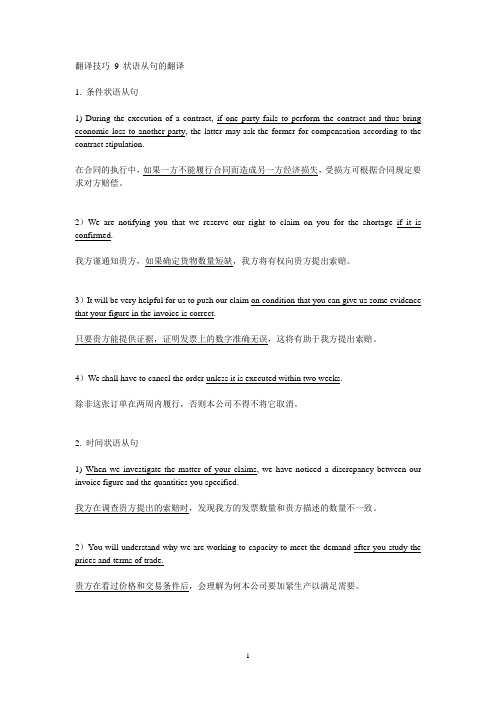
翻译技巧9 状语从句的翻译1. 条件状语从句1) During the execution of a contract, if one party fails to perform the contract and thus bring economic loss to another party, the latter may ask the former for compensation according to the contract stipulation.在合同的执行中,如果一方不能履行合同而造成另一方经济损失,受损方可根据合同规定要求对方赔偿。
2)We are notifying you that we reserve our right to claim on you for the shortage if it is confirmed.我方谨通知贵方,如果确定货物数量短缺,我方将有权向贵方提出索赔。
3)It will be very helpful for us to push our claim on condition that you can give us some evidence that your figure in the invoice is correct.只要贵方能提供证据,证明发票上的数字准确无误,这将有助于我方提出索赔。
4)We shall have to cancel the order unless it is executed within two weeks.除非这张订单在两周内履行,否则本公司不得不将它取消。
2. 时间状语从句1) When we investigate the matter of your claims, we have noticed a discrepancy between our invoice figure and the quantities you specified.我方在调查贵方提出的索赔时,发现我方的发票数量和贵方描述的数量不一致。
英语语法:五类状语从句的翻译讲解
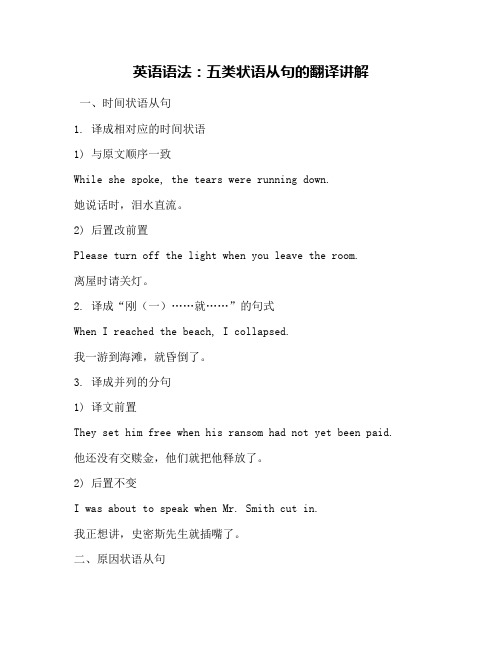
英语语法:五类状语从句的翻译讲解一、时间状语从句1. 译成相对应的时间状语1) 与原文顺序一致While she spoke, the tears were running down.她说话时,泪水直流。
2) 后置改前置Please turn off the light when you leave the room.离屋时请关灯。
2. 译成“刚(一)……就……”的句式When I reached the beach, I collapsed.我一游到海滩,就昏倒了。
3. 译成并列的分句1) 译文前置They set him free when his ransom had not yet been paid.他还没有交赎金,他们就把他释放了。
2) 后置不变I was about to speak when Mr. Smith cut in.我正想讲,史密斯先生就插嘴了。
二、原因状语从句1. 译成表“因”的分句1) “因”在“果”之前The crops failed because the season was dry.因为气候干旱,作物歉收。
2) “果”在“因”之前She could get away with anything, because she looked such a baby.她能渡过任何风险,因为她看上去简直还像娃娃模样。
2. 译成因果偏正复句中的主句Pure iron is not used in industry because it is too soft.纯铁太软,所以不用在工业上。
Because he was convinced of the accuracy of this fact, he stuck to his opinion.他深信这件事准确可靠,所以坚持己见。
3. 译成无关联词的因果关系并列分句Where there is sound, there must be sound waves.哪里有声音,哪里就必有声波。
常见从句的翻译

IV. 译成状语
有些定语从句从形式上看是定语,但在意义上与主句有逻辑状 语关系,对主句其原因、结果、目的、条件、让步等状语作用, 翻译时应尽可能按照其语法功能,译成与汉语相对应的复句。
21. The computer, which seems to play the role of a human brain, is often called an electronic brain. 由于计算机起着类似人脑的作用,所以常常被称作电脑。(译成 原因状从)
20 20
13. Why did you give up when you could make it? 既然你能成功,干嘛要放弃呢?(时间状从译 为让步状从)
14. She sang resonantly, if slightly nasally. 她唱歌声音洪亮,尽管鼻音略显重了些 (条件状从译为让步状从)
19. He has a son of twenty who is now at the college. 他有个二十岁的儿子现在正上大学。
20. This was the first time I had serious trouble with my leader. 这是我第一次和领导发生严重纠葛。
17 17
状语从句的翻译
➢I. 按照原文顺序译出状语从句
1. If you do not mind, I will turn off the heating. 如果你不介意,我就把暖气关上了。
2. As far as I know, there isn’t such a word in English. 据我所知, 英语里并没有这个单词。
罗斯服了中药,结果缓解了症状。(译成结果状从)
6各种从句的翻译汇总

17
3.When censorship laws are relaxed, dishonest people are given a chance to produce virtually anything in the name of “art”
3
II. Translation Skills
1.
先翻译从句,即从句前置 This is a universally accepted principle of international law that the territory sovereignty doesn’t admit of infringement.
状语转译技巧
时间
条件
These three colors ,red ,green ,and violet ,when combined ,produced white .
红色、绿色和紫色这三种颜色如果合在一起就变成白色。
12
地点
条件
Where there is nothing in the path of beam of light ,nothing is seen.
7
3.增加“即”(或“以为”)或用冒号、破折 号分开 But considered realistically, we had to face the fact that our prospects were less than good. 但是现实地考虑一下,我们不得不正视这样的事 实:我们的前景并不妙。
6
பைடு நூலகம்
When reports came into London zoo that a wild puma had been spotted forty-five miles south of London ,they were not taken seriously.
英语八大从句类型例句
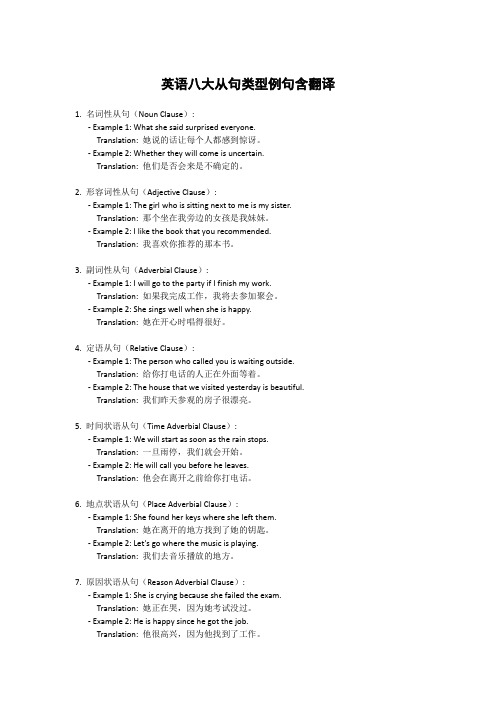
英语八大从句类型例句含翻译1. 名词性从句(Noun Clause):- Example 1: What she said surprised everyone.Translation: 她说的话让每个人都感到惊讶。
- Example 2: Whether they will come is uncertain.Translation: 他们是否会来是不确定的。
2. 形容词性从句(Adjective Clause):- Example 1: The girl who is sitting next to me is my sister.Translation: 那个坐在我旁边的女孩是我妹妹。
- Example 2: I like the book that you recommended.Translation: 我喜欢你推荐的那本书。
3. 副词性从句(Adverbial Clause):- Example 1: I will go to the party if I finish my work.Translation: 如果我完成工作,我将去参加聚会。
- Example 2: She sings well when she is happy.Translation: 她在开心时唱得很好。
4. 定语从句(Relative Clause):- Example 1: The person who called you is waiting outside.Translation: 给你打电话的人正在外面等着。
- Example 2: The house that we visited yesterday is beautiful.Translation: 我们昨天参观的房子很漂亮。
5. 时间状语从句(Time Adverbial Clause):- Example 1: We will start as soon as the rain stops.Translation: 一旦雨停,我们就会开始。
从句的译法
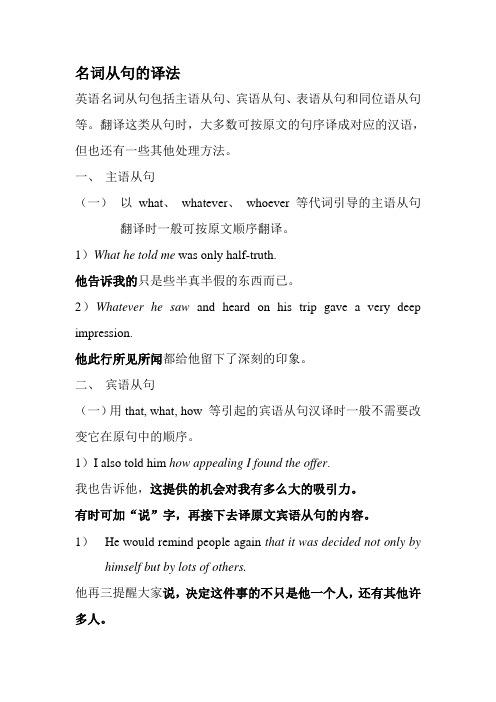
名词从句的译法英语名词从句包括主语从句、宾语从句、表语从句和同位语从句等。
翻译这类从句时,大多数可按原文的句序译成对应的汉语,但也还有一些其他处理方法。
一、主语从句(一)以what、whatever、whoever 等代词引导的主语从句翻译时一般可按原文顺序翻译。
1)What he told me was only half-truth.他告诉我的只是些半真半假的东西而已。
2)Whatever he saw and heard on his trip gave a very deep impression.他此行所见所闻都给他留下了深刻的印象。
二、宾语从句(一)用that, what, how 等引起的宾语从句汉译时一般不需要改变它在原句中的顺序。
1)I also told him how appealing I found the offer.我也告诉他,这提供的机会对我有多么大的吸引力。
有时可加“说”字,再接下去译原文宾语从句的内容。
1)He would remind people again that it was decided not only by himself but by lots of others.他再三提醒大家说,决定这件事的不只是他一个人,还有其他许多人。
三、表语从句英语表语从句和宾语从句一样,一般可按原文顺序翻译。
1)What he emphasized over and over again was that no matter how difficult it might be, they should never retreat even for an inch.他所再三强调的是,不管多么困难,他们决不应该后退寸步。
2) That was how a small nation won the victory over a big power.就这样,小国战胜了大国。
英语从句的翻译
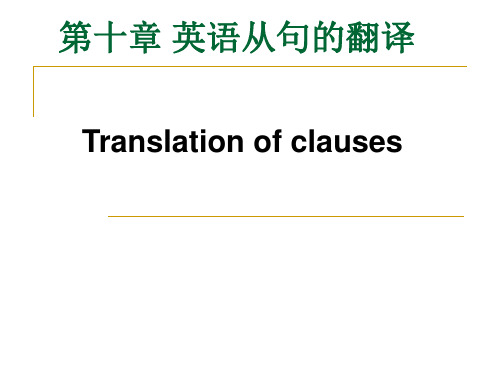
(4)The Seller ensure that all the equipment listed in Appendix One to the Contract are brand-new products whose performance shall be in conformity with the Contract and which are manufactured according to current Chinese National Standards or Manufacture’s Standard. 卖方保证本合同附件一所列全部设备都是新 产品,是根据现行的中国国家标准,或生产 厂的标准制造的,其性能符合合同规定。
2、分译法 (1)A fuel is a material which will burn at a reasonable temperature and produce heat. 燃料是一种物质,在适当温度下能燃烧并放出 热量。 (2)A healthy diet includes enough but too many kinds of foods that provide the body with the nutrients that it needs to function properly. 健康的饮食包括的食物应该充足但不过多。这 些食物提供身体正常活动所必需的营养。
4thesellerensurelistedinappendixonetothecontractarebrandnewproductsshallbeinconformitywiththecontractandwhicharemanufacturedaccordingcurrentchinesenationalstandardsormanufacturesstandardthatalltheequipmentwhoseperformanceto卖方保证本合同附件一所列全部设备都是新产品是根据现行的中国国家标准或生产厂的标准制造的其性能符合合同规定
五类状语从句的翻译
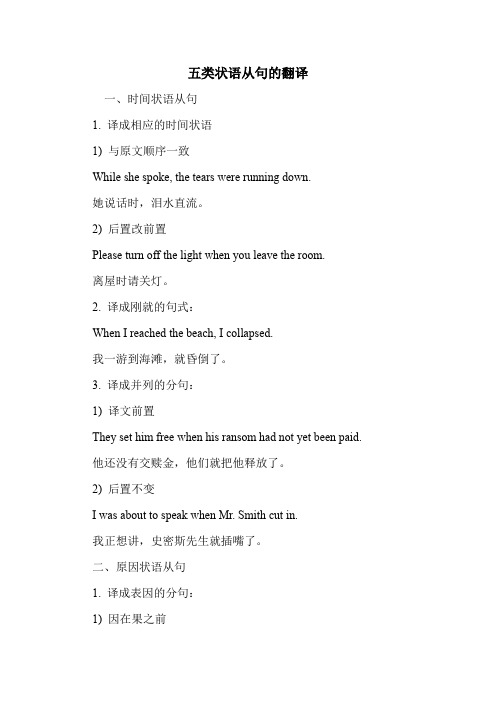
五类状语从句的翻译一、时间状语从句1. 译成相应的时间状语1) 与原文顺序一致While she spoke, the tears were running down.她说话时,泪水直流。
2) 后置改前置Please turn off the light when you leave the room.离屋时请关灯。
2. 译成刚就的句式:When I reached the beach, I collapsed.我一游到海滩,就昏倒了。
3. 译成并列的分句:1) 译文前置They set him free when his ransom had not yet been paid. 他还没有交赎金,他们就把他释放了。
2) 后置不变I was about to speak when Mr. Smith cut in.我正想讲,史密斯先生就插嘴了。
二、原因状语从句1. 译成表因的分句:1) 因在果之前The crops failed because the season was dry.因为气候干旱,作物歉收。
2) 果在因之前She could get away with anything, because she looked such a baby.她能渡过任何风险,因为她看上去简直还像娃娃模样。
2. 译成因果偏正复句中的主句:Pure iron is not used in industry because it is too soft.纯铁太软,所以不用在工业上。
Because he was convinced of the accuracy of this fact, he stuck to his opinion.他深信这件事正确可靠,因此坚持己见。
3. 译成无关联词的因果关系并列分句:Where there is sound, there must be sound waves.哪里有声音,哪里就必有声波。
从句的翻译
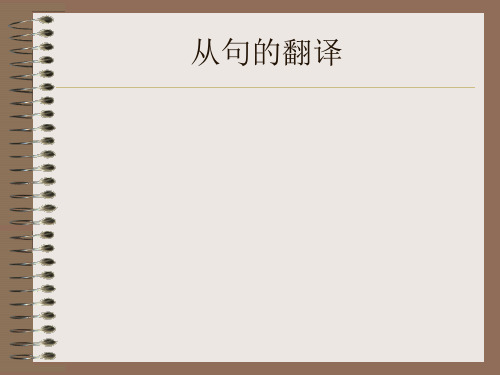
五ቤተ መጻሕፍቲ ባይዱ定语从句的译法
• 英语定语从句的译法主要涉及到限制性 定语从句的译法和非限制性定语从句的 译法。此外,有些英语定语从句和主句 间还存在着状语关系,对这种定语从句 也值得探讨。
(一)限制性定语从句
• 限制性定语从句对所修饰的先行词起限 制作用,与先行词关系密切,不用逗号 分开。翻译这类句子时往往可以用:
从句的翻译
• 英语中有主语从句、宾语从句、表语从 句、定语从句(含同位语从句)、状语 从句等。
一.主语从句
• (一)以what, whatever, whoever 等代词引导 的主语从句一般按原文语序翻译。 • 1) What he told me really surprised me. • 他所告诉我的着实让我吃惊。 • 2)Whatever he saw and heard on his trip gave him a very deep impression. • 他此行所见所闻都给他留下了深刻印象。 • 3) Whoever has traveled in that region must remember the waterfalls. • 凡是到过那个地区的人是一定记得那些瀑布 的
• 3) We have to face the fact that our prospects were less than good. • 我们不得不正视这样一个事实:我们的 前景并不乐观。 • 4) There was the chance that a small electrical spark might lead to a big fire. • 有这样的可能——一 一个小小的电火花 可能引起一场大火。
(二)用it作假宾语的句子, 汉译时that 引起的宾语从句一 般按原文顺序;it不译 。
8.各种从句的翻译汇总
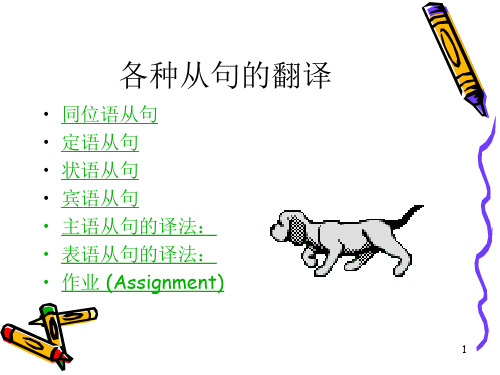
27
to be.
三、表示条件的状语从句
• 译成表“条件”的分句 • 译成表“假设”的分句 • 译成表补充说明情况的分句
28
• 译成表“条件”的分句 1. It was better in case they were
captured.
不管他遭受什么不幸事儿,他总是把胸一 挺,说“没关系,我再加把劲儿。”
35
五、表示目的的状语从句
• 译成表“目的”的前置分句 • 译成表“目的”的后置分句
36
• 译成表“目的”的前置分句 • He pushed open the door gently and stole out of the room for fear that
7
• 3.增加“即”(或“以为”)或用冒号、 破折号分开 But considered realistically, we had to face the fact that our prospects were less than good. 但是现实地考虑一下,我们不得不正视这 样的事实:我们的前景并不妙。
9
• Yet, from the beginning, the fact that I was still alive was ignored.
• 然而,从一开始,我仍然活着这个事实 却被他们忽视了。
10
what, how how 等引起的宾语从句译 • 用 that, that, what, 成汉语时一般不需要改变它在原句中顺序; 用 it 作假宾语的句子,汉译时 that 引导 的宾语从句一般可按原文顺序; it 不译。 I told him that because of the last condition, I’d have to turn it down.
宾语从句,状语从句,定语从句,表语从句的详细讲解及例句

当我们学习语法时,我们常常会遇到几种从句,包括宾语从句、状语从句、定语从句和表语从句。
下面逐个进行详细讲解,并给出相应的例句。
1. 宾语从句(Object Clause):宾语从句用来做主句中的宾语。
它通常由连接词引导,如that, if, whether, what, where, who, whom, whose等。
例句:- I don't know what he wants.(我不知道他想要什么。
)- She asked if he could come to the party.(她问他是否能来参加派对。
)- They wonder where we are going.(他们想知道我们要去哪里。
)2. 状语从句(Adverbial Clause):状语从句用来修饰主句中的动词、形容词、副词,表示时间、地点、原因、条件、结果等。
它通常由连接词引导,如when, while, because, if, although, since等。
例句:- We will go hiking if the weather is good.(如果天气好,我们将去远足。
)- He studied hard until he passed the exam.(他学习努力直到通过考试。
)- Although it was raining, they still went out.(虽然下雨了,他们仍然出去了。
)3. 定语从句(Relative Clause):定语从句用来修饰主句中的名词或代词,对其进行限定或说明。
它通常由关系代词引导,如that, which, who, whom, whose等。
例句:- The book that I bought yesterday is very interesting.(我昨天买的那本书很有趣。
)- The person who is talking to Mary is my brother.(正在和玛丽说话的那个人是我哥哥。
从句的翻译
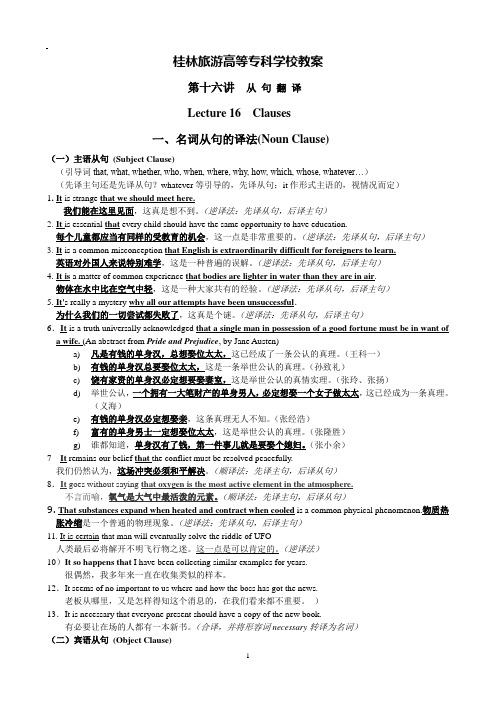
桂林旅游高等专科学校教案第十六讲从句翻译Lecture 16 Clauses一、名词从句的译法(Noun Clause)(一)主语从句(Subject Clause)(引导词that, what, whether, who, when, where, why, how, which, whose, whatever…)(先译主句还是先译从句?whatever等引导的,先译从句;it作形式主语的,视情况而定)1.It is strange that we should meet here.我们能在这里见面,这真是想不到。
(逆译法:先译从句,后译主句)2. It is essential that every child should have the same opportunity to have education.每个儿童都应当有同样的受教育的机会,这一点是非常重要的。
(逆译法:先译从句,后译主句)3. It is a common misconception that English is extraordinarily difficult for foreigners to learn.英语对外国人来说特别难学,这是一种普遍的误解。
(逆译法:先译从句,后译主句)4. It is a matter of common experience that bodies are lighter in water than they are in air.物体在水中比在空气中轻,这是一种大家共有的经验。
(逆译法:先译从句,后译主句)5. It's really a mystery why all our attempts have been unsuccessful.为什么我们的一切尝试都失败了,这真是个谜。
(逆译法:先译从句,后译主句)6.It is a truth universally acknowledged that a single man in possession of a good fortune must be in want of a wife. (An abstract from Pride and Prejudice, by Jane Austen)a)凡是有钱的单身汉,总想娶位太太,这已经成了一条公认的真理。
英语翻译高级句式从句
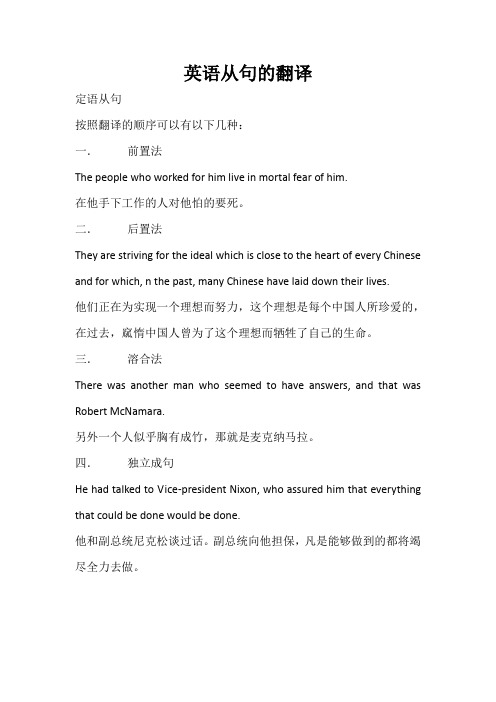
英语从句的翻译定语从句按照翻译的顺序可以有以下几种:一.前置法The people who worked for him live in mortal fear of him.在他手下工作的人对他怕的要死。
二.后置法They are striving for the ideal which is close to the heart of every Chinese and for which, n the past, many Chinese have laid down their lives.他们正在为实现一个理想而努力,这个理想是每个中国人所珍爱的,在过去,窳惰中国人曾为了这个理想而牺牲了自己的生命。
三.溶合法There was another man who seemed to have answers, and that was Robert McNamara.另外一个人似乎胸有成竹,那就是麦克纳马拉。
四.独立成句He had talked to Vice-president Nixon, who assured him that everything that could be done would be done.他和副总统尼克松谈过话。
副总统向他担保,凡是能够做到的都将竭尽全力去做。
宾语从句一.用that,how,what等引起的宾语从句汉译时一般不改变顺序I told him that because of the last condition, I’d have to turn it down. 我告诉他,那是最后一个条件,我只得谢绝。
二.用it作假宾语的句子,译时that引起的宾语从句一般可按原文顺序;it不译。
I made it clear to them that they must hand in their papers before 10 o’clock in the morning.我向他们讲清楚了的,他们必须在上午十点前交卷。
如何翻译从句
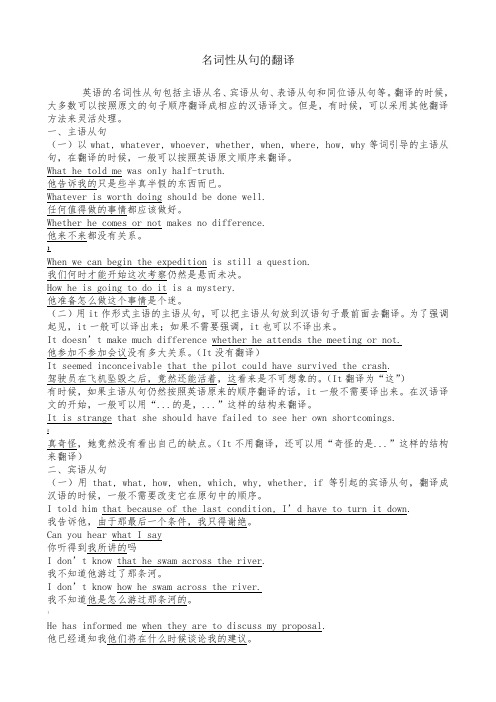
名词性从句的翻译英语的名词性从句包括主语从名、宾语从句、表语从句和同位语从句等。
翻译的时候,大多数可以按照原文的句子顺序翻译成相应的汉语译文。
但是,有时候,可以采用其他翻译方法来灵活处理。
一、主语从句(一)以what, whatever, whoever, whether, when, where, how, why等词引导的主语从句,在翻译的时候,一般可以按照英语原文顺序来翻译。
What he told me was only half-truth.他告诉我的只是些半真半假的东西而已。
Whatever is worth doing should be done well.任何值得做的事情都应该做好。
Whether he comes or not makes no difference.他来不来都没有关系。
】When we can begin the expedition is still a question.我们何时才能开始这次考察仍然是悬而未决。
How he is going to do it is a mystery.他准备怎么做这个事情是个迷。
(二)用it作形式主语的主语从句,可以把主语从句放到汉语句子最前面去翻译。
为了强调起见,it一般可以译出来;如果不需要强调,it也可以不译出来。
It doesn’t make much difference whether he attends the meeting or not.他参加不参加会议没有多大关系。
(It没有翻译)It seemed inconceivable that the pilot could have survived the crash.驾驶员在飞机坠毁之后,竟然还能活着,这看来是不可想象的。
(It翻译为“这”)有时候,如果主语从句仍然按照英语原来的顺序翻译的话,it一般不需要译出来。
在汉语译文的开始,一般可以用“...的是,...”这样的结构来翻译。
各种从句的翻译

他看起来好像昨晚没睡好。
分析
在这个句子中,“as if he hasn't had a good night's sleep”是表语从句,对主语“He”进行描述。在翻译时 ,可以将引导词“as if”翻译为“好像”,将句子翻译为 “他看起来好像昨晚没睡好”。
04 同位语从句的翻译
CHAPTER
状语从句的翻译技巧
理解从句的语义关系
在翻译状语从句时,首先要理解从句与主句 之间的语义关系,确定从句在句子中的作用 和含义。
调整语序
由于中英文表达习惯的不同,翻译时可能需要对语 序进行调整,使译文更加符合目标语言的表达习惯 。
选用合适的引导词
在翻译过程中,需要根据从句的语义关系选 择合适的引导词,确保译文的准确性和流畅 性。
例句2
The book which you lent me was very interesting.
翻译
我们班有个女孩,她的父亲是位 著名的科学家。(融合法)
例句3
There is a girl in our class whose father is a famous
scientist.
翻译
你借给我的那本书很有趣。(后 置法)
主语从句的翻译技巧
顺译法
01
按照汉语的表达习惯,将主语从句放在句首进行翻译。
倒译法
02
为了符合汉语的表达习惯,将主语从句放在句末进行翻译,同
时用“这”、“那”等代词复指。
融合法
03
将主语从句和主句融合在一起进行翻译,使译文更加流畅自然
。
案例分析
案例一
案例二
That the earth goes round the sun is known to all. 地球绕着太阳转是众所周知 的。
英语从句翻译方法
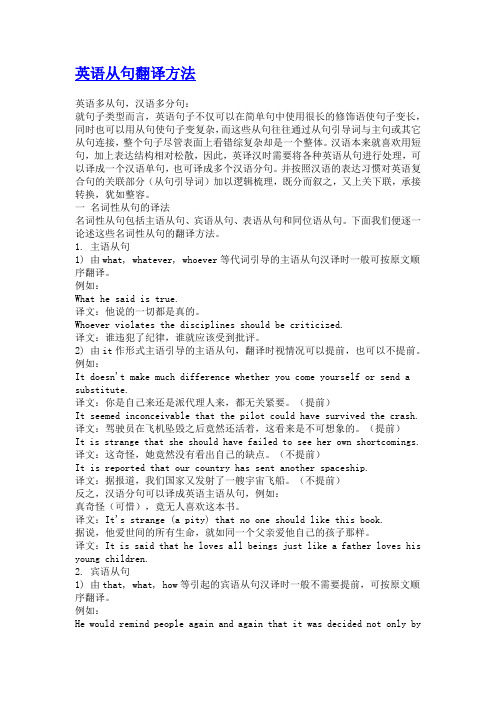
英语从句翻译方法英语多从句,汉语多分句:就句子类型而言,英语句子不仅可以在简单句中使用很长的修饰语使句子变长,同时也可以用从句使句子变复杂,而这些从句往往通过从句引导词与主句或其它从句连接,整个句子尽管表面上看错综复杂却是一个整体。
汉语本来就喜欢用短句,加上表达结构相对松散,因此,英译汉时需要将各种英语从句进行处理,可以译成一个汉语单句,也可译成多个汉语分句。
并按照汉语的表达习惯对英语复合句的关联部分(从句引导词)加以逻辑梳理,既分而叙之,又上关下联,承接转换,犹如整容。
一名词性从句的译法名词性从句包括主语从句、宾语从句、表语从句和同位语从句。
下面我们便逐一论述这些名词性从句的翻译方法。
1. 主语从句1) 由what, whatever, whoever等代词引导的主语从句汉译时一般可按原文顺序翻译。
例如:What he said is true.译文:他说的一切都是真的。
Whoever violates the disciplines should be criticized.译文:谁违犯了纪律,谁就应该受到批评。
2) 由it作形式主语引导的主语从句,翻译时视情况可以提前,也可以不提前。
例如:It doesn't make much difference whether you come yourself or send a substitute.译文:你是自己来还是派代理人来,都无关紧要。
(提前)It seemed inconceivable that the pilot could have survived the crash. 译文:驾驶员在飞机坠毁之后竟然还活着,这看来是不可想象的。
(提前)It is strange that she should have failed to see her own shortcomings. 译文:这奇怪,她竟然没有看出自己的缺点。
(不提前)It is reported that our country has sent another spaceship.译文:据报道,我们国家又发射了一艘宇宙飞船。
- 1、下载文档前请自行甄别文档内容的完整性,平台不提供额外的编辑、内容补充、找答案等附加服务。
- 2、"仅部分预览"的文档,不可在线预览部分如存在完整性等问题,可反馈申请退款(可完整预览的文档不适用该条件!)。
- 3、如文档侵犯您的权益,请联系客服反馈,我们会尽快为您处理(人工客服工作时间:9:00-18:30)。
3.增加“即”(或“以为”)或用冒号、破折 号分开
But considered realistically, we had to face the fact that our prospects were less than good.
但是现实地考虑一下,我们不得不正视这样的事 实:我们的前景并不妙。
一个国家的领土不容侵犯,这是国际法中尽人皆 知的准则。
4
It does not alter the fact that he is the man responsible for the delay.
But for many, the fact that poor people are able to support themselves almost as well as without government aid as they did with it is in itself a huge victory.
5
2.拆分法 Canada has long subscribed to the view that
no state should use its territory or allow it to be used in such a way as to injure the environment of another state or of the "international commons". 长期以来,加拿大一直认为,任何国家都不 应该用自己的领土或允许别国利用其领土来破 坏另一个国家或"国际社会"的环境。
红色、绿色和紫色这三种颜色如果合在一起就变成白色。
12
地点
条件
Where there is nothing in the path of beam of light ,nothing is seen.
如果光束通道上没有东西,就什么也看不到。
13
原因
因果
Because he was convinced of the accuracy of this fact, he stuck to his opinion.
力。
9
有时可加“说”字 He would remind people again that it was
decided not only by himself but by lots of others. 他再三提醒大家说,决定这件事的不只是他一个 人,还有其他许多人。
10
用it作假宾语的句子,it可不译。
3
II. Translation Skills
1. 先翻译从句,即从句前置 This is a universally accepted principle of international law that the territory sovereignty doesn’t admit of infringement.
I have no idea how to explain it An idea came to him that he might write to
her to ask more information about the matter . I’ ve got an answer that surprised me a lot.
他深信这件事正确可靠,因此坚持已见。
14
状语和状语从句的翻译
概述
时间 原因 条件 让步 目的
15
一、时间状语从句的译法
译成相应的表示时间的状语 译成“刚……就……”的句式 译成并列分句
16
一、时间状语从句的译法
译成相应的表示时间的状语 1. While she spoke, the tears were running down. 她说话时,泪水直流。 2.Pleasae turn off the lights when you leave the room. 离屋时请关灯。
8
宾语从句的翻译
用 that, what, how 等引导的宾语从句 I told him that because of the last condition, I’d
have to turn it down. 我告诉他,由于那最后一个条件,我只得谢绝 I also told him how appealing I found the offer. 我也告诉他,这提供的机会对我有多么大的吸引
6
When reports came into London zoo that a wild puma had been spotted forty-five miles south of London ,they were not taken sehe would come over to visit China again.
17
3.When censorship laws are relaxed, dishonest people are given a chance to produce virtually anything in the name of “art”
I made it clear to them that they must hand in their papers before 10 o'clock in the morning.
我向他们讲清楚了的,他们必须在上午十点以 前交卷。
11
状语从句的翻译
状语转译技巧
时间
条件
These three colors ,red ,green ,and violet ,when combined ,produced white .
各种从句的翻译
同位语从句 定语从句 状语从句 宾语从句
1
同位语从句的翻译
2
I. Basic concept
I’m greatly shocked when I heard the news that his father died yesterday.
The teacher came to the conclusion that the student had been lying .
